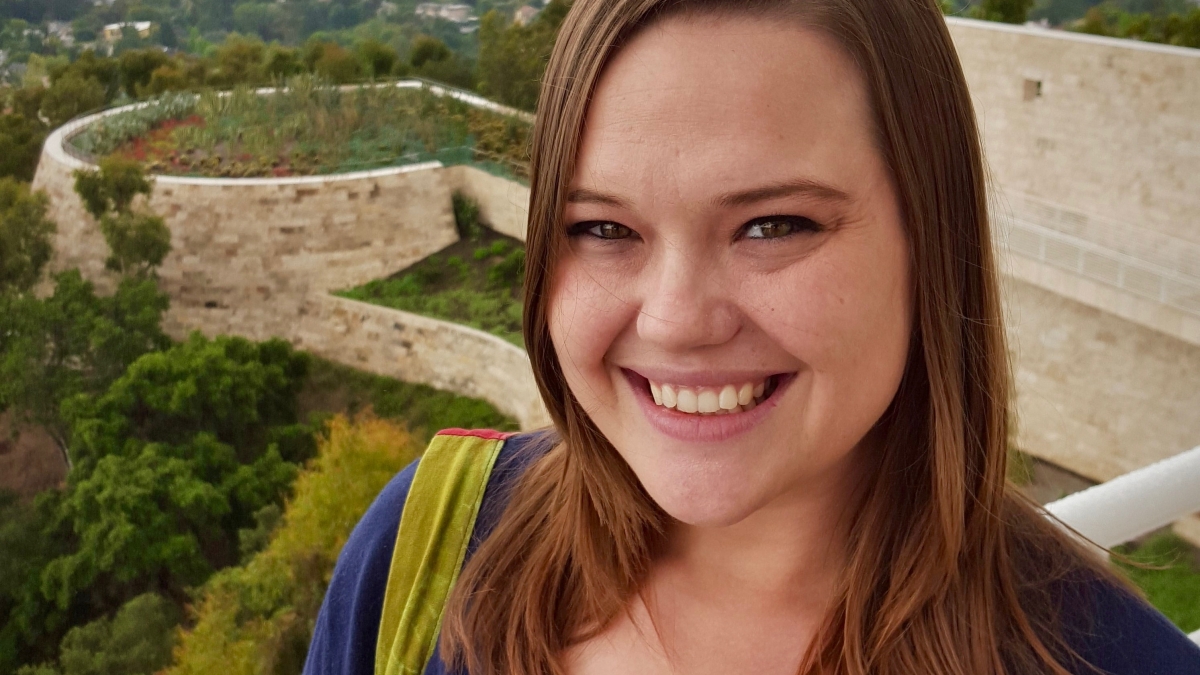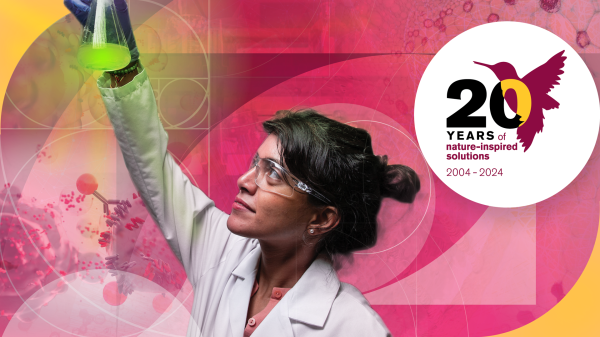Overcoming the odds: Graduate earns doctorate in real-life ‘Cinderella story’

A first-generation college student from Phoenix, Elizabeth Barnes is graduating with her doctorate in biology and society from the ASU School of Life Sciences. Photo by Jonathan Jackson
Editor’s note: This is part of a series of profiles for spring 2018 commencement.
Passion. Hard work. And courage.
These are the things Elizabeth Barnes focused on while earning her PhD from Arizona State University.
As a first-generation college student from Phoenix, it took courage to have confidence that she could succeed. It took hard work, not only through years of teaching, studying and conducting research, but also by building the professional relationships she would need to help achieve her goals. And it took a concerted effort to remain diligent and passionate about her career path, despite uncertainties along the way.
But Barnes is no stranger to struggle. When she was a teenager, life was especially hard. Due to circumstances out of her control, she made the decision to drop out of high school and take care of herself. Eventually, she found her way into classes at a community college, and soon after, into Arizona State University.
And this is where her Cinderella story really comes true.
Barnes earned her doctorate in biology and society from the School of Life Sciences, in the College of Liberal Arts and Sciences. Also, she received the Faculty Women’s Association Distinguished Graduate Student award for 2018 and will begin working at ASU after graduation.
Question: What was your “aha” moment, when you realized you wanted to pursue a career in your field?
Answer: The moment I learned that almost half of the population in the USA does not accept evolution as valid I knew I wanted to study evolution education. As an undergraduate, science quickly became my favorite subject and I took any science class that fit into my full-time work schedule — they all fascinated me. In introductory physics, I realized the significance of the “billions and billions” of galaxies that coexist with our tiny little planet. I realized how small and insignificant I was in the vastness of it all while feeling an undeniable urge to tell the whole world about it.
In my first biology class, my feeling of insignificance became a simultaneous feeling of grandeur as I learned about the evolution and common ancestry of life. In this small tiny corner of one ordinary galaxy something incredible had taken place. The universe had established “a way of knowing itself” through tiny changes in differential reproductive success throughout billions of years and had become conscious! It was from this borderline obsession with empirical knowledge about the universe and evolution that my identity as a scientist and a science educator began to form. Then, when I found out that so many people were resistant towards evolution, I knew I had to find a way to change it.
Q: Why did you choose ASU?
A: I dropped out of high school when I was 16 because of a difficult home life. I left my parents’ house and became a full-time waitress at Denny’s so that I could gain the independence and agency I desperately needed to succeed. Two years later I enrolled in community college without a high school diploma or GED.
After some time at community college, ASU allowed me to enroll in a bachelor’s degree program despite my untraditional past. Fast-forward 10 years later and I am now Dr. Elizabeth Barnes with eight peer-reviewed publications on how to communicate science effectively and with national recognition for the work I have done as a PhD student. I am so thankful for ASU’s principle that they are defined “not by who we exclude, but by who we include.” I wholeheartedly believe that my success is an exemplary example of why that principle is so important.
Q: What’s something you learned while at ASU — in the classroom or otherwise — that surprised you, that changed your perspective?
A: When I transferred to Arizona State University, the biology and society program headed by Professor Jane Maienschein caught my attention. This program was surprising and unique in that science education, bioethics, policy, and history and philosophy of science were all housed in a science department. Faculty in this program were not only participating in the discovery of scientific knowledge, but they were asking difficult questions surrounding how we should use this knowledge and how the fruits of the scientific enterprise affect attitudes and behaviors of the public.
I became engulfed in the sociopolitical and religious issues surrounding controversial scientific subjects like evolution and climate change. I began to see the power of combining empirical evidence with an understanding of societal influences, and my interdisciplinary interest in science and society was cemented. What was surprising to me was how interrelated all of these topics were, and I realized in order to understand how to communicate science most effectively, I had to have a grasp on all of the dimensions — bioethics, history and philosophy of science, and the social psychology behind the learning of controversial scientific topics.
Q: What’s the best piece of advice you’d give to those still in school?
A: A quote from Nobel Prize-winning physicist Richard Feynman comes to mind:
“Fall in love with some activity and do it! Nobody ever figures out what life is all about, and it doesn't matter. Explore the world. Nearly everything is really interesting if you go into it deeply enough. Work as hard and as much as you want to on the things you like to do the best. Don't think about what you want to be, but what you want to do.”
I’ve always loved this quote because it illustrates the importance of passion and hard work and not just hard work on anything but hard work on something that you love to do.
Q: What was your favorite spot on campus, whether for studying, meeting friends or just thinking about life?
A: There is a small little garden-type area with a birdbath and benches behind the Virginia Piper house that is quite hidden and that almost nobody knows about. It’s a beautiful spot and offers a reprieve from the busyness that is ASU’s campus. I spent many hours there studying and reading.
Q: What are your plans after graduation?
A: To promote evolution education and convince everyone to find evolution as fascinating as I do! To do that, I will be working as a post-doc in (ASU Assistant Professor) Sara Brownell’s biology education research lab for the next year. During this time, I will be looking for my dream job as a professor who will create my own research lab exploring effective science communication.
Q: If someone gave you $40 million to solve one problem on our planet, what would you tackle?
A: This is such a hard question, but one I have contemplated quite a bit! I would love to create a wildlife preserve that also acts as an educational center for promoting science literacy about ecology, evolution and conservation.
Q: Thinking back over your time at ASU, what challenges did you face, and how did you overcome them?
A: The biggest challenge I have encountered is learning how to navigate the culture of academia and foster confidence in myself and my ideas. Being a first-generation college student with very little exposure to the academic domain, there was so much I did not know about how to succeed. From navigating financial aid, to learning how to communicate with my peers and instructors in college, everything was a learning curve. I overcame my lack of knowledge and confidence by seeking out mentorship and remaining diligent and passionate despite these challenges.
I’m not going to lie, it was scary! I remember sitting outside of my professor’s office doors shaking with nerves to meet with them. However, someone once told me that sometimes the most profound and important moments in our life are achieved by having just five minutes of unabashed courage.
Ever since then when I got nervous, I would tell myself, “Just have 5 minutes of courage,” and I still utilize this to this day to overcome. I eventually found amazing mentors who have helped me to learn the culture of academia and how to turn my hard work and determination into tangible and impactful pieces of work.
Q: Are there any particular people, professors, advisers or friends who really supported you on your journey — and what did they do to help?
A: I cannot express enough how important my mentors were in helping me achieve success in my time at ASU. Jane Maienschein has been nothing short of an amazing advocate for me starting as an undergraduate. She connected me to my first research mentors, helped me develop my beginning skills as a science writer, gave me my first job at ASU as a student worker, and since has gone on to promote me and my research at the biggest scientific venues, including the American Association for the Advancement of Science in which she included me as a speaker on a panel of prominent science communicators.
Jane also introduced me to my current PhD adviser, Sara Brownell, who has had more impact on my intellectual development and academic success than anyone. Sara has worked tirelessly with me for almost five years helping me to develop my teaching, research and presentation skills to be exceptional. Further, she has been a fervent promoter of our research and has served as a great emotional support in the times when I needed it most.
Sara taught me the most important thing I have learned as an academic — that good is not good enough, exceptional is the only acceptable product of research, mentorship and teaching. I could not have done all of the amazing things I have without both of these very important mentors. They have been the ideal role models.
Q: Looking back, is there anything you would go back and change?
A: Not a single thing! My time here has been amazing, and to want to change anything would be a disservice to that experience.
More Science and technology

ASU-led Southwest Advanced Prototyping Hub awarded $21.3M for 2nd year of funding for microelectronics projects
The Southwest Advanced Prototyping (SWAP) Hub, led by Arizona State University, has been awarded $21.3 million in Year 2 funding…

Celebrating '20 Years of Discovery' at the Biodesign Institute
Editor’s note: The Biodesign Institute at Arizona State University wraps up its 20th anniversary with the sixth and final…

Student research supports semiconductor sustainability
As microelectronics have become an increasingly essential part of modern society, greenhouse gas emissions, which are associated…